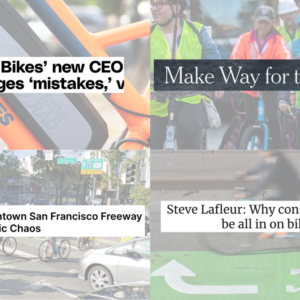“The US has big economic problems. But they have been made worse, and harder to resolve, by a half-century in which, at federal urging, the country was misbuilt.”
— Christopher Caldwell, The Weekly Standard
Reflecting on Obama’s address to congress last week (in which he said that America “cannot walk away from” the automobile), columnist Christopher Caldwell penned a rebuttal in the Financial Times against the President’s plans for massive government spending — on the nation’s highways.
Caldwell, a senior editor for conservative news publication The Weekly Standard, spends the bulk of the column casting President Eisenhower’s Federal Highway Act in an unfavorable light (the Highway Act passed with strong support in 1956 and created our interstate highway system).
The negative effects of the new highway system became clear almost immediately, Caldwell writes — the word “sprawl” was coined in 1958.
Caldwell goes on to enumerate what he sees to be the many problematic consequences of the Highway Act, including unfettered speculative development, smog, the erasure of green countryside, inequitable subsidies for gas, auto, and road industries, the “erosion of public transportation infrastructure,” and the vast increase of public infrastructure costs that comes with dispersed development.
The big lesson here, according to Caldwell, is that “legislators cast their votes without even a hint of a sense that they might not know what they were doing, or that sums of money big enough to do your country much good are also big enough to do it much harm.”
He concludes:
The US has big economic problems. But they have been made worse, and harder to resolve, by a half-century in which, at federal urging, the country was misbuilt.
…The failures [of misguided government projects] are fixable only through equally extensive projects to undo them. This makes it easy to forget that there is no social or economic problem so big that a poorly targeted government intervention cannot make it worse.
In a session on the history of federal transportation funding at the TRB annual meeting in January, I learned that federal funding for transportation infrastructure projects was rare and controversial before 1956. Even canal and railway systems were built by the states through which they ran — the federal government provided only the right-of-way.
The building of the highway system, and the need to maintain it, changed all of that. Now, Caldwell points out, road projects make up the largest single chunk, at $27 billion, of Obama’s transportation package.
Despite government focus on roads, it seems that American car culture is already changing rapidly. Streetsblog reported this morning on a new traffic information study that found that “peak hour congestion on the major roads in urban America decreased nearly 30% in 2008 versus 2007.”
If we are as a nation going to continue to walk — or bike — away from our dependence on the private car, part of that equation must include a change in federal funding priorities and mechanisms.







Thanks for reading.
BikePortland has served this community with independent community journalism since 2005. We rely on subscriptions from readers like you to survive. Your financial support is vital in keeping this valuable resource alive and well.
Please subscribe today to strengthen and expand our work.
I defend the idea of spending all that money on stimulus, but hate the idea of all that highway spending. Of course, how much of that was needless compromise directed at getting Republican votes?
peejay,
none, since the bill passed without major republican support.
the stimulus package is a child of the democrats in congress.
Anonymous:
You’re technically right, but if you recall, in the lead-up to the stimulus vote, the Dems gave stuff up in the hope that more Repubs would support it. Was this wise? No. But that’s why it happened.
Not saying the Democrats are blameless, both in tactics on the vote, and in priorities regarding smart spending. And, they do have a large rump of “Blue Dog” Democrats, who are in many ways as bad as Republicans (and are often from highly conservative districts that would not elect a progressive Democrat).
What’s my point? It is that while we have one party more in line with our sustainable priorities, it can not be trusted to act in our best interests always, and certainly not in the pressure-cooker of a Washington still dominated by the moneyed interests, and their paid-for media talking heads. We must fight every battle, and push the discourse slowly to the side of common sense. I do not trust the Democrats, but I cannot support the Republicans, now that the party has gone from the party of Lincoln to the party of Limbaugh.
Wrong. Obama and the Democrats deeply compromised the bill to try to win Republican support. Ultimately only 3 Republicans (very crucial ones, though) went along. They could have passed a much better bill if they hadn’t compromised, but maybe they had to try, hoping that the Republicans might for once actually put the country’s good ahead of scoring political points. Didn’t happen, but worth trying.
According to the New York Times, Feb. 12:
“Many Democrats would have preferred a larger bill, but agreed to pare back, including cuts to favored education and health programs, to win three crucial Republican votes in the Senate.
…
The deal reflected a calculated gamble by Mr. Obama in the first weeks of his term. To win Republican votes, the final stimulus package is considerably leaner than what many economists say is now needed to jolt the economy, given its grave condition.
…
House Democrats, angry over some cuts, particularly for school construction, initially balked at the deal and delayed a final meeting on Wednesday between House and Senate negotiators.
…
Despite intense lobbying by governors around the country, the final deal slashed $25 billion from a proposed state fiscal stabilization fund, eliminated a $16 billion line item for school construction and sharply curtailed spending to provide health insurance for the unemployed.
In driving down the total cost — from $838 billion for the Senate stimulus bill and $820 billion for the House-passed measure — lawmakers also reduced the Senate’s proposed tax incentives for buyers of homes and cars, which hold big public appeal.
The final agreement retained a $70 billion tax break to spare millions of middle-income Americans from paying the alternative minimum tax in 2009. Some Democrats decried the provision as a costly addition that would not lift the economy and that Congress would have approved, regardless of the recession.
…
Even before the last touches were put to the bill, some angry Democrats said that Mr. Obama and Congressional leaders had been too quick to give up on Democratic priorities. “I am not happy with it,” said Senator Tom Harkin, Democrat of Iowa. “You are not looking at a happy camper. I mean they took a lot of stuff out of education. They took it out of health, school construction and they put it more into tax issues.”
Mr. Harkin said he was particularly frustrated by the money being spent on fixing the alternative minimum tax. “It’s about 9 percent of the whole bill,” he said, “Why is it in there? It has nothing to do with stimulus. It has nothing to do with recovery.”
But even as Congressional leaders and top White House officials went through the package with a carving knife, it was clear that the three Republicans who agreed to support the bill in the Senate wielded extraordinary power, and along with conservative Democrats, had put a firm stamp on the stimulus package.
..
Bretto,
I don’t see anything in your post about the Democrats adding dollars for transportation construction to the stimulus to court Republicans. All I see is that they cut programs (including Health and Education) to try and get more Republican support.
Sorry, I was responding to the notion that “the stimulus package is a child of the democrats in congress.” In fact, a significant portion of the final package resulted from a desire to appease Republicans. Someone with more time or expertise will have to track down the derivation of highway spending components. I’d like to have seen what the Democrats would have come up with if they hadn’t been so intent on cultivating in image of bipartisanship rather than thinking about what’s best for the country. Maybe there would have been more spending on mass transit and even bikes? Maybe not….
Elly-
How may people trust the content of your stories if you do not leave a record of your corrections and misstatements? Will the new intern also be a proofreader/researcher to correct your work prior to publishing? What a chore, eh?
As an example, your referencing of Obama’s State of the Union address in this post as a present/past event, when he has yet to even deliver one.
I understand it may be embarrassing to be corrected so often, but you have chosen this career!
the guy writes for newspapers. his job is to write things to get people to read him and hopefully buy newspapers.
There is no connection to any reality other than that, unless you choose to make that connection.
hey, hes robert novaks son in law. Im not prone to pay him attention.
As someone that worked on Capitol Hill until very recently I can tell you that the legislation is very much a compromise. Initial transportation “Wish lists” that came from the Transportation and Infrastructure Committee was both larger and more progressive. While the cuts were the good news that the $27 billion in “highway spending” is only highway spending in terms and thought. Legally, it was actually written to be flexible enough to be used for all sorts of projects. For more info, I would suggest checking out this post on infrastructurist.
http://www.infrastructurist.com/tag/setting-the-record-straight/
cheers!